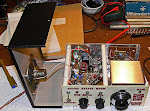Having subsequently back to South of the Border, some hundred miles to the south, I usually reckon to see swallows two or three days before that particular date, but unusually this year, it is now April 30th, and no swallows have yet come to my attention (I am not saying they aren't hereabouts!). However, unusually this morning the first house martins I've seen were swooping around the front of my QTH. Usually swallows are to be seen before the martins in my experience.
TS-180S Repair - Part 2
It is now time to report on the progress with my ailing TS-180S. Until yesterday evening there wasn't much to report save that I had come to a couple of conclusions.
Firstly, the radio definitely has a problem with the PLL circuitry. That's enough to make one feel that this could be a long haul! PLL circuits can be difficult to diagnose and fix, as they only work when the loop is closed, and a fault anywhere in that loop could potentially stop the PLL from working. This radio has a quite early implementation of the "PLL derived PreMix System" which became popular in era immediately prior to the adoption of full synthesis and continuous coverage. Trio improved the circuitry for their very popular TS-120 model, but I am left to struggle with their earlier attempt. The PLL circuitry doesn't lock very well, and when it does lock, for a 100kHz change in VFO frequency, the actual het. frequency derived in the PLL Premix system only changes by 60kHz.
The TS-180S PLL Board
The second conclusion I came to after probing around the circuitry with a spectrum analyser was that the high gain Wide Band Amplifier between the VCO stages and the prescaler/divider was producing a lot of garbage.
I'd previously checked out the condition of the two electrolytic capacitors in this part of the board on my ESR tester, and they suprisingly appeared to be absolutely fine.
With this knowledge I began to ponder how I might break into the loop and possibly inject test signals from a stable source, (ie replace the WBA with a signal generator and see how things behave), but before doing that I decided I would check the DC conditions around the five transistor WBA. These checks showed that the first transistor in the chain (Q14) appeared to be short circuit in all directions. Hah! That is clearly not going to help!
I'd previously checked out the condition of the two electrolytic capacitors in this part of the board on my ESR tester, and they suprisingly appeared to be absolutely fine.
With this knowledge I began to ponder how I might break into the loop and possibly inject test signals from a stable source, (ie replace the WBA with a signal generator and see how things behave), but before doing that I decided I would check the DC conditions around the five transistor WBA. These checks showed that the first transistor in the chain (Q14) appeared to be short circuit in all directions. Hah! That is clearly not going to help!
The 8-40MHz Wide Band Amplifier - things are just a bit tight in there!
Anyhow, the faulty transistor was extracted with no little difficulty, tested, and yes, it is completely dud.
Unfortunately I don't appear to have anything close to it in my spares, so it will have to be an EBay search for something suitable. The original transistor type is 2SC1907 which has a very high fT (>1GHz), so any old gash BC182 just won't cut it on this occasion! According to the data sheet the 2SC1907 was designed for UHF TV local oscillator applications.
To be continued ...







